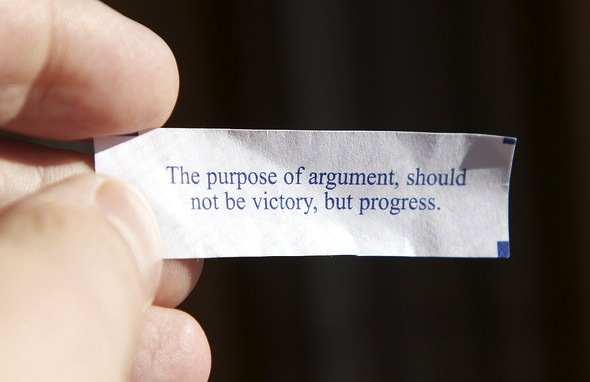The Purpose of Argument Online
The "public face of social liberalism" is synonymous with "an endless list of things that you can't do or say or think, and with the constant threat of being called an existentially bad person if you say the wrong thing," journalist Freddie deBoer writes.
After long experience debating socially concerned people online, journalist Freddie deBoer associates “the public face of social liberalism” with “danger… an endless list of things that you can’t do or say or think, and with the constant threat of being called an existentially bad person if you say the wrong thing.”
DeBoer’s remarks were published Thursday, in a column on Andrew Sullivan’s The Dish. On Twitter, Facebook and in online comment sections, he wrote, “social liberalism has ceased to seem positive, joyful, human, and freeing”:
I’m far from alone in feeling that it’s typically not worth it to engage, given the risks. … in the online forums where so much political discussion happens these days, the slightest misstep will result in character assassination and vicious condemnation.
… If you are a young person who is still malleable and subject to having your mind changed, and you decide to engage with socially liberal politics online, what are you going to learn immediately? Everything that you like is problematic. Every musician you like is misogynist. Every movie you like is secretly racist. Every cherished public figure has some deeply disqualifying characteristics. All of your victories are the product of privilege. Everyone you know and love who does not yet speak with the specialized vocabulary of today’s social justice movement is a bad, bad person. That is no way to build a broader coalition, which we desperately need if we’re going to win.
… People have to be free to make mistakes, even ones that we find offensive. If we turn away from everyone that says or believes something dumb, we will find ourselves lecturing to an empty room. Surely there are ways to preserve righteous anger while being more circumspect about who is targeted by that anger. And I strongly believe that we can, and must, remind the world that social justice is about being happy, being equal, and being free.
On the same day, political blogger Kevin Drum at Mother Jones added:
Some of this is simply the price of speaking in public. The problem is that in the past there were lots of different publics. Some were small, maybe no more than family or friends. Some were a bit larger: people you worked with, or went to school with. There were local publics, statewide publics, and national publics. The bigger the public you addressed, the more vitriol you could expect to get in return. The vitriol still wasn’t fun, but it was, in some sense, a trade made with your eyes open.
No longer. If you write a blog post or a tweet, and the wrong person just happens to highlight it, your public is suddenly gigantic whether you meant it to be or not. Then the avalanche comes. And, as deBoer says, the avalanche is dominated by the loudest, angriest, least tolerant fringes of the language and conduct police.
As someone who has engaged in precisely the kind of behavior deBoer and Drum criticize, I’ll add that the experience of being aggressive about political matters online is often accompanied by a solemn sense of duty to expose injustice and shame its perpetrators. The assumption is that these tactics have the power to change behavior. Sometimes they do.
But more often the result is a kind of large, interpersonal version of Garrett Hardin’s “Tragedy of the Commons.” A single cry of “Shame!” well timed and appropriately directed can halt misbehavior and provoke salutary reflection. But a torrent of condemnation coming from all angles, impersonally aimed and rising out of general feelings of pain and resentment, creates an environment of fear, hostility and mental and emotional isolation that is part of what the majority of people involved seem eager to end.
Read the rest of deBoer’s thoughtful essay here.
— Posted by Alexander Reed Kelly.
Your support matters…Independent journalism is under threat and overshadowed by heavily funded mainstream media.
You can help level the playing field. Become a member.
Your tax-deductible contribution keeps us digging beneath the headlines to give you thought-provoking, investigative reporting and analysis that unearths what's really happening- without compromise.
Give today to support our courageous, independent journalists.








You need to be a supporter to comment.
There are currently no responses to this article.
Be the first to respond.